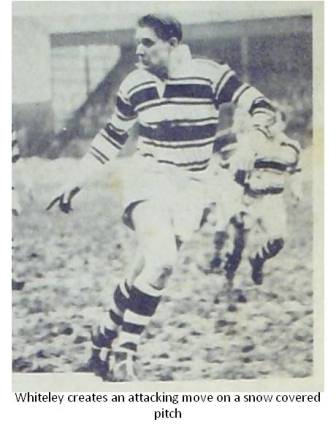Hull FC legend Johnny Whiteley MBE
As part of the Mails bid to mark the 70th anniversary of the worst two nights of the Hull Blitz, Hull FC legend Johnny Whiteley relives how he survived the terrible nights of May 7th and 8th, 1941, which killed hundreds of innocent civilians.
IN the devastated remains of Scarborough Street in west Hull, a group of children played among the bombed houses.
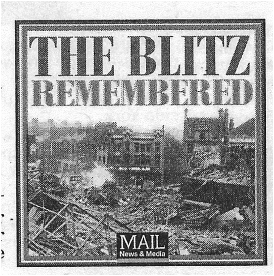
Using rolled up paper tied together with string as a rugby ball, they emulated their Hull FC heroes from the nearby Boulevard.
With the rubble and remains their new playground, they showed no fear despite seeing their street devastated.
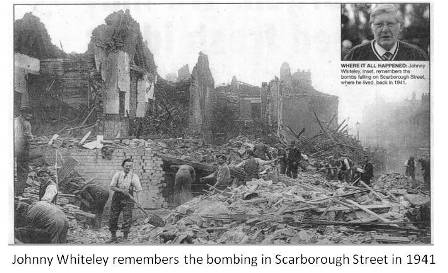
Among the group was a confident young 11-year-old from Hessle Road called John.
Already starting to see his skills emerge, his talent eventually saw him never dropped during a glittering 15-year career with Hull FC.
Its the spring of 1941 and Johnny Whiteley had no idea how lucky he is. He does now.
I suppose looking back we didn't really take in the magnitude of everything that was going on. We were just kids,
explains Whiteley as he reflects on those events 70 years later.
Considering his house was hit by the biggest bomb to land in Hull in the war its a miracle Whiteley survived childhood.
It has been a long time since those war days, but I can still remember them clearly. The air raid sirens rang all too often.
It was my job when the siren rang to get my little sister, put her in my mums clothes basket and run as fast as I could to get us in the bomb shelter.
Unfortunately, I had to do that all too frequently.
Living on Scarborough Street, Gentleman John
had to contend with growing up without his father for six years as he fought in the war.
Sport was his escape. But there were no thoughts of having a career as successful as he did, just a desire to lose himself in exercise.
However, try as he may he could'nt escape the effects of war especially when his Hull home was destroyed.
Fortunately, we were in an air raid shelter at the time, but the bomb was so huge it sent the door of the shelter hurtling across the room,
he recalls.
When everything calmed down, we crawled out of the shelter and the roof of our house at 45 Scarborough Street had disappeared.
That bomb blew half of our - street away What I remember most of all, though, was the camaraderie in the city.
None of us had anything really, but what we had we shared. It brought us all together and I think that spirit is still evident in Hull. Its what makes it a wonderful city.
We were like, one big family all in it together.
Sport was a big thing for us kids, playing together was all we really had. The coaches of the local teams had all gone off to fight in the war so we had to rely on each other.
The streets had to be our rugby and football pitches because all the fields had anti-aircraft guns on them.
We played among the debris and the rubble because there was little option, but to us kids it did'nt matter.
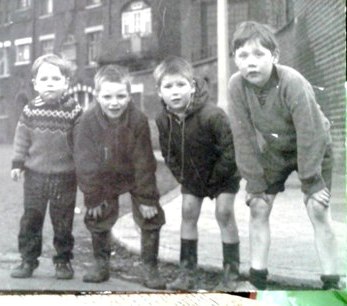
Typical young lads in the street in the 40s and 50s
Whiteley attended Gordon Street Junior School, later home to Hull FCs first-team training and now the clubs gym for their academy teams.
But with education limited because of the war he left at 14 to work on the docks before becoming a rugby league star always an athletic youngster and renowned in his playing days for his fitness, Whiteley says those Blitz days played a big part in shaping his future.
There was a lot of running about in those days and because of the war if you wanted to get anywhere you walked or you ran.
It was a great base for my fitness looking back. We learnt life the hard way, it was tough growing up in that sort of environment, but it has'nt done any of us any harm at all.
They were tough times for the city of Hull, just as they were for many families across the country.
But that spirit pulled us through and that will be my lasting memory.
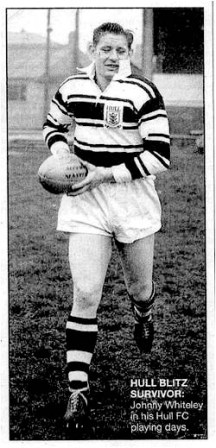
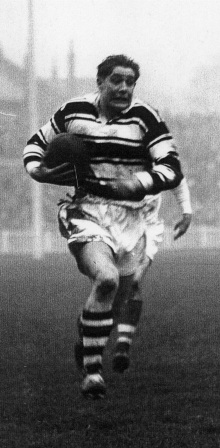
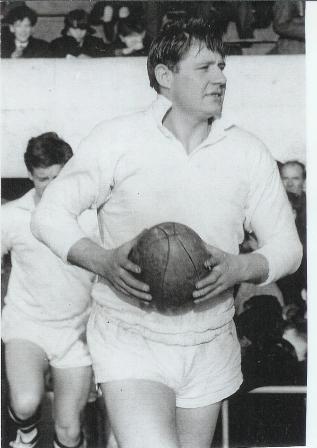
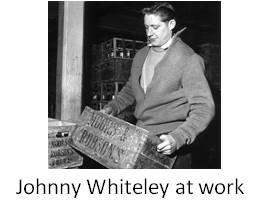
From the Hull Daily Mail, www.thisiseastriding.co.uk Friday May 6 2011
IN A GAME which provides greater opportunities for destruction than construction, it borders on the tragic that Hull F.C. captain Johnny Whiteley, as the result of the latest of his many mishaps, may have to hang up his Boots.
I have long considered Whiteley, apart from his general character, as being one of the greatest of the games loose-forwards, and as a handler and distributor of the ball I have known none better.
Strange that I should praise Whiteley or any loose-forward for his constructive ability. Before World War I there was a great outcry against the destructiveness of our No.13's. Many supporters wanted forwards reduced to five, but the majority realised that a loose-forward, at his best, has a most important role to play-and Whiteley certainly played It.
In my early days, I was greatly impressed by Charlie Seeling the famous All-Black who joined Wigan. He too, had a wonderful pair of hands, and. apart from acquitting himself like a back in open play, he acted as a kind of watch dog on the opposing scrum half and often dived spectacularly to make the tackle.
Alertness in this respect contributed to the outcry against the loose-forward, and yet, when the off-side law was not broken, it was football of the highest quality.
In Seelings day, the forwards packed tight, using their weight to secure possession, and the ball had to come from the rear of the scrum, not the side as it so often does today, it was the primary duty of Seeling and all loose-forwards to rigidly guard the blind side, and tackle the opposing scrum-half immediately the ball into his hands.
Today, methods are different. The loose packing and quicker break-up enables six forwards instead of one to play the loose role, and, in the circumstances, Whiteleys ability to raise above modern methods and secure the same famous individuality as the famous All Black did 50 years ago is greatly to his credit
Nearest approach in recent times has been Billy Iveson, now Successfully coaching Workington Town. The Cumbrian, like WhietIey and Seeling handled the ball with the skill of a juggler.
By contract, Frank Gallagher, of Dewsbury and Batley, far famed for his prowess as a No.13 showing his speed on the ball and the same characteristics applied to Douglas Clark of Huddersfield, who frequently filled the role.
It is only when one turns back the pages of history that one is forced to realise how wonderfully rich has been the Rugby League in loose forwards ever since Bert Avery, of Oldham, and Billy Ward. Of Leeds, went to Australia with the first tourist of 1910.
Later came Jack Price (Broughton Rangers and Wgan), followed by Harold Young (Bradford Northern) Fred Butters (Swinton) whose tackle on Chimpy Busch saved Great Bzitain from defeat in 1930. Jack Feetham, (Hull Kingston Rovers and Salford), Harry Beverley (Hunslet). Harold Ellerington (HuIl F.C.), Ike Owen (Leeds), Harry Murphy (Wakefield Trinity), Ken Traill (Bradford Northern) and Harry Street (Dewsbury) Derek Turner Wakefield. All played the role of loose forward to standard, but none has surpassed the technique Johnny Whiteley has introduced into his play.
In forward play, generally, there is crudeness that produces a negative result. Physique, when misused is obnoxious, and we certainly see plenty of it, I have often wished we had more Whiteleys or other forwards of the type of Trevor Foster (Bradford Northern). Dick Huddart (St. Helens), Ben Gronow (Huddersfied) Joe Thompson (Leeds) and Australian friends such as Pat McCue, Frank Burge and Walter Prlgg.
There is so much to be gained by good. Intelligent forward play, and so little satisfaction to be derived from the methods some of our teams adopt. Why do they play it the hard way? .









